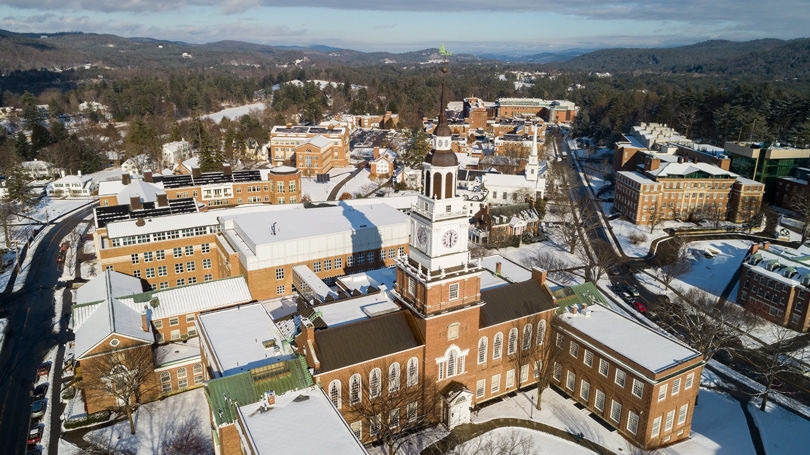
- About
- Departments
- Construction on Campus
- Service Requests
Back to Top Nav
Back to Top Nav
The plan will provide a strategic framework for future decisions about campus and beyond.
Dartmouth is beginning a master planning process that will provide a strategic framework to be used as the basis for making decisions about future development of the institution.
The plan will present a 20-year vision for the campus and other land Dartmouth owns in the Upper Valley and in northern New Hampshire, inform initiatives already in the development pipeline, and create a broad perspective for future projects. It will consider sustainable development and preservation of the historic campus, including buildings, landscape, and open spaces.
“I welcome the opportunity to think about how master planning can support Dartmouth’s academic mission and create a roadmap for growth and change in a way that sustains and enriches the physical identity of our institution,” says President Philip J. Hanlon ’77.
In addition to its 2,800 acres in Hanover, Dartmouth owns 2,200 acres adjacent to the Dartmouth-Hitchcock Medical Center in Lebanon; 540 acres in Lyme at the Dartmouth Skiway; 35 acres across the Connecticut River in the area of Norwich known as Lewiston; 4,500 acres on Mount Moosilauke in Warren, N.H.; and 27,000 acres at the Second College Grant in Errol, N.H., near the Maine border.
The planning work is expected to take nine months and result in a master plan to be shared with the community this fall. Faculty, staff, students, alumni, and residents of Hanover and other Upper Valley communities will be invited to participate in the project, which will include Dartmouth town hall meetings, focus groups, and other forums. The first meeting for members of the campus community is expected to be held in the spring.
“We all recognize the need for a comprehensive master plan to help guide our investments in the campus,” says Provost Joseph Helble. “A careful and sensitive master plan can help Dartmouth preserve what is best about our campus while preparing it for the future.”
The last campus master plan was completed in 1998 by architect Lo-Yi Chan ’54; it was updated in 2001 and 2002. In 2012, a comprehensive planning processes was started, but put on hold when then-President Jim Yong Kim left Dartmouth. Some planning has been done since 2012, including 2017 master plans for the west end of campus and the Tuck School of Business, in addition to a plan for Dartmouth’s energy future.
The new plan will provide a framework, analysis, and options that align the institution’s mission and goals with physical planning needs.
The work will integrate coordination of projects under construction, such as the rebuilding of Dana (the former biomedical library) and the west end expansion, as well as projects in the design stages, including a new building in the west end that will house the Arthur L. Irving Institute for Energy and Society. Also to be considered are a future residence hall on Crosby Street and the proposed biomass energy plant.
The work will also address the preservation of the architectural landscape and protection of the character of the campus, and encourage sustainability. New spaces to support the school’s goals and mission, property redevelopment, and the repurposing of both undeveloped sites and underdeveloped sites will all be considered, as will Dartmouth’s downtown Hanover properties and those beyond Hanover.
Dartmouth will work with architects and planners at Beyer Blinder Belle in New York City and landscape architects Michael Van Valkenburgh Associates, based in New York City and Cambridge, Mass. Together, the two firms have campus planning and design experience at nearly 40 colleges and universities across the United States. The firms, which worked with the College on the west end and Tuck campus plans, were selected following a nationwide search for consulting teams that had experience working with complex campus settings.
“We look forward to working with the Dartmouth community to envision the future of the campus in a way that will enhance its historic beauty while making it more sustainable and connected. We also look to encourage collaboration across campus and with residents of Hanover and the region,” says Neil Kittredge, a partner at Beyer Blinder Belle.
The planning team includes BFJ Planning, for transportation and parking work; BuroHappold Engineering, for sustainability, infrastructure and energy planning; and Nitsch Engineering, for work on sustainable stormwater management.
Susan J. Boutwell can be reached at susan.j.boutwell@dartmouth.edu.